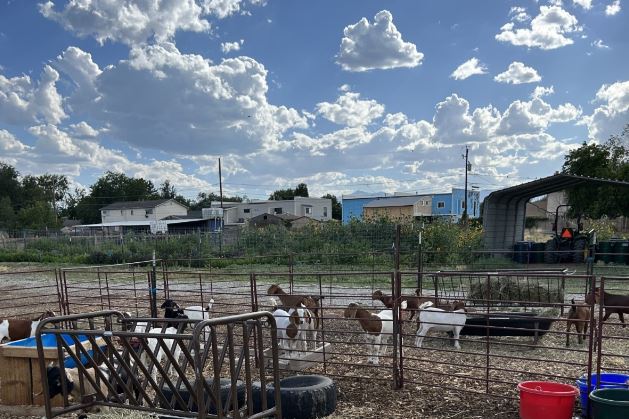By SLCgreen Intern Emma Johnson and Staff Jude Westwood

On Salt Lake City’s West Side, near the old water park, lives a sizable herd of goats. The same piece of land also houses sheep, chickens, beehives, and many garden plots filled with a variety of plants.
Although the Farm is managed by Roots, Utah’s first farm-based charter school, fifteen of the goats on the property are owned by the “The New American Goat Club.” The Goat Club is a summer educational program for refugee and immigrant youth interested in learning about goat husbandry. It’s also one of SLCgreen’s 2023 Food Equity Microgrant awardees.
The Microgrant program launched earlier this year, providing $35,000 in total funding to different groups and individuals working on food sovereignty, nutrition, sustainable gardening, and increasing access to culturally relevant foods.
The Program’s Heritage
The New American Goat Club was born out of the East African Refugee Goat Project. This project, now run as a non-profit called Utah Refugee Goats, is an 80-acre ranch located by the airport and run by refugees as a source of income, a way to produce culturally appropriate goat meat and continue traditional livestock practices.
I talked with Alex Ngendakuriyo, a Burundian Refugee involved in the East African Goat Project, about his experience raising goats growing up. He explained how his family “used goats for a lot.” In addition to using goats as a food source, they used goat skins to make drums and clothing, gave goats as gifts and as dowries, and relied on them as a form of savings account. “If something happens, we sell the goat to solve the problem. Or if school is starting and you’re in need of school materials, you sell the goat and have money to go buy materials for the children.”
Although Alex converted to Christianity, for Muslim community members having meat prepared to their religious standards is essential. If they weren’t producing it themselves, halal meat would be difficult to find and expensive in Utah.
Passing Traditions On
Alex values the youth programming of the New American Goat Club, because it helps kids “know what their parents enjoyed doing or [what] their grandparents enjoyed doing.” He sees the club as more than agricultural, hoping “learning basic goat care and showmanship will be beneficial [for the youth]” by teaching them “leadership skills, team-building skills, communication skills and responsibility.”
Kate Wright, a club leader, says “I think that’s the most powerful thing about our club is that we have this really amazing opportunity for intergenerational sharing of knowledge and experiences around goat husbandry.” It blows her away every year “how quickly the group turns into a community.”
Although the East African community started the club, it’s grown to serve refugee and immigrant youth from other regions. That’s part of why leaders including Matt Kennedy, Kate Wright, and Claire Kennedy chose to include the term ‘New American’ in the club’s name, to reflect the inclusivity of its current mission.
Goat Club
The club has been a considerable success, growing from just five youth participants in 2015 to sixteen members between ages 8-18 in the 2023 class.
Currently, the club meets once a week throughout the summer (although participants are encouraged to visit their goats on their own time as well). The group gets goats in the spring and learns to handle them in preparation for a show at the end of the season in August. Since the club raises goats for meat, participants focus on feeding and displaying their goats in a way that will be favorable to buyers.
Uplifting Education
Claire Kennedy also described how when they have participants graduate from high school, they hold workshops to help teach them about potential next steps in their education. “It’s been really rewarding to watch them use the skills they learned here to get into college and get scholarships,” she said. It helps that the club is affiliated with 4H, the largest global youth organization, which gives the club access to networking resources and scholarship pathways.

The Show Must Go on!
Like other 4H agricultural clubs in the state, the New American Goat Club historically showed their goats at the county fair. However, in 2020 during the coronavirus pandemic, the club leaders were worried about the lack of safety precautions at the fair. “Our kids are coming from higher-risk communities, so we were able to work closely with Roots here to pivot and put on our own show,” explained Matt Kennedy, a club leader. All the leaders emphasized that the partnership with Roots High School has been instrumental in the success and flexibility of the club over the past few years.
The mini livestock fair at Roots proved to be more accessible and enjoyable for New American community members, so they’ve been holding it there ever since, along with the school’s 4H club. At this smaller, community-run fair, participants still get to show their goats, get judged by a volunteer panel, win prizes for their work, then auction off goats at the end.
The team talked about how fun and rewarding the event always is, and especially how nice it is to be able to run it themselves. Since the New American Goat Club is an independent organization, they can have a difficulty fundraising to get the support they need. Talula Pontuti, the newest addition to the club leadership, expressed how helpful the SLCgreen microgrant will be. Raising goats is often pricey, but it’s important to the communities they serve.
Get to Know the Goats

This year youth will be showing their goats from 9 am to 2 pm on Saturday, August 19th, at Roots Charter High School. Attendance is open to everyone, and Swahili food will be available for purchase. It will be a fun way to connect with animals, meet new people, and see the work of the New American Goat Club up close.
